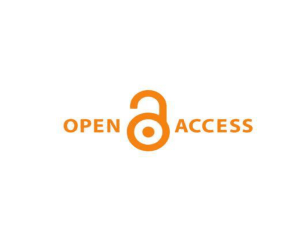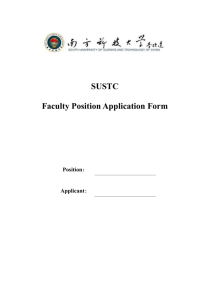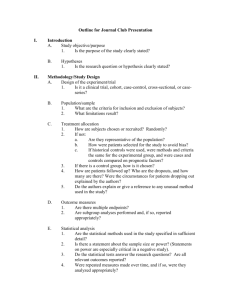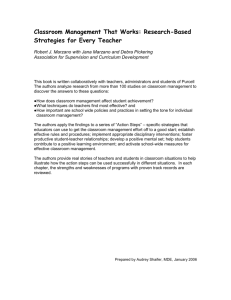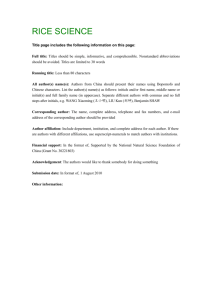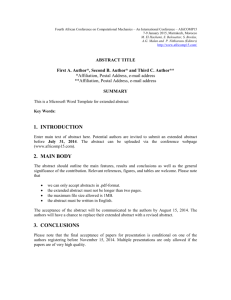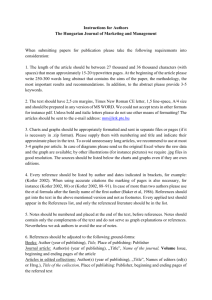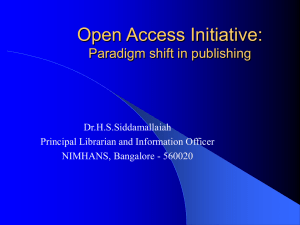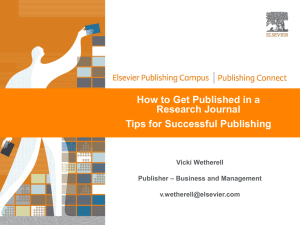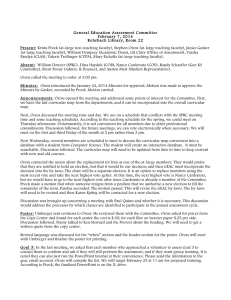View/Open
advertisement
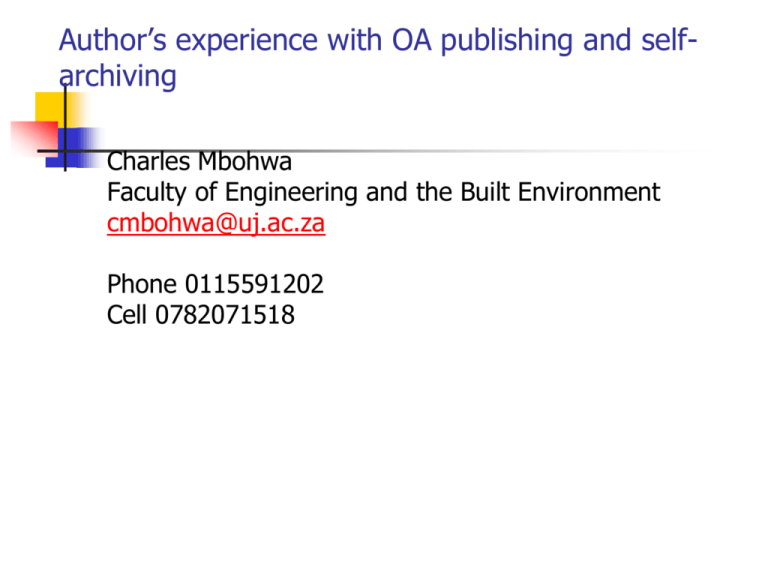
Author’s experience with OA publishing and selfarchiving Charles Mbohwa Faculty of Engineering and the Built Environment cmbohwa@uj.ac.za Phone 0115591202 Cell 0782071518 Experience and Challenges with OA publishing and self-archiving Historical Archiving in 2004 to 2006 at University of Zimbabwe Submitted List of Publications and Post Print Versions of Papers Tedious search for historical documents in different archives- floppy disks; five and a quarter inches; three and half inches; Flush disks; Portable hard disk; Old computer Lull 2007 to 2013 2013 Invitations to UJ IR and started to respond Challenge to dig into the folders and recover documents Easier this time due to Portable hard disks- One is now more than 8 years old and luckily still working Challenge of historical documents- over the last 7 years at UJ Might focus on 43 publications that are Scopus-indexed OROSS- great step ensured 100% compliance for me in 2014 Benefits and Opportunities of OA publishing and self-archiving Benefits: Internet Presence more than doubled- Search for “Mbohwa” after UZ deposits- Have all now disappeared Got requests for student supervision from all over the world Reduces direct request for publications and related workload- offenses of no acknowledgements/ responses Could be authenticated more easily by people that I tried to contact through e-mails and through the Internet. Citation of papers. Especially journal papers improved. Citations increase with age of paper. Students, researchers, governments and stakeholders can access essential results and information openly Opportunities: Improve Institutional Presence and impact Improve Department/Faculty/Institution Status and Ranking due to more citations Access of work by peers more easily. Disadvantages OA publishing and self-archiving Disadvantages: Good and bad invitations to conferences, Journals and book publications Excessive workload associated with historical documents Impact of predatory publishers that occupy the open access space- for example excessive payment to publish papers: Nothing to do with IR though! Some of them listed on ISI and IBSS/ Indexed by Scopus. Later removed at expense of author/ reputation Violate ethics codes; Publisher is Editor; Suspect Boards; Academic credentials lacking; Same Editorial boards for many journals; Bogus Boards; Scholars unaware of Board appointment Commercialised based on publication fees; Fleet of journals; Swiss journal based in India!; False impact factor Disadvantages OA publishing and self-archiving Disadvantages: Confused journal name and mission; Spam review requests; Indexed in non-indexing resources; False indexing; Plagiarism and copyright disrespected Self-review of paper not checked; Encourage republications; no copy editing; non-academic papers; No phone contacts or names of people Copy verbatim or with minimal editing guides and templates; Dodgy contacts- account in Dubai- phone in Asia and location in Europe. Extremely broad journal title; Combines incompatible field; Copyright transfer on submission! Uses un-licenced images; Spam call for papers; Use free e-mail suppliersgmail, yahoo etc. No ISSN or DOI or used improperly; rapid publication and peer review; No focus on readers; One man of few people operation Not listed in standard periodical directories; not catalogued in library database; Copy titles; Editorial Board member do not publish in the journal- Same fos conferences Institutional Cyber Internet Decay ERROR The requested URL could not be retrieved The following error was encountered while trying to retrieve the URL: http://ir.uz.ac.zw/ Read Error The system returned: (104) Connection reset by peer An error condition occurred while reading data from the network. Please retry your request. General Discussion Gold open access – making research papers freely available via the journal where they are published- At what cost? For free? Policing? Predators? Green open access, where the paper (usually the author’s final revision following peer review) is placed in a freely accessible university repository. Institutional benefits. Challenge- lack of cooperation by authors. Which option is cheaper for whom? Can transparent market competition occur with Golden access? Who bears the high costs of transition? Incentives for open access for authors? Higher Education Funding Council for England (HECFE) – only papers placed in institutional repositories considered eligible for quality assessment of research outputs? Assessments determine disbursement of research funds – carrot and stick for researchers/ authors General Discussion Challenge: immediate deposit of scholarly journal articles into institutional repository soon peer review & acceptance- reduced embargo periods benefits author Access to research for all. More overheads and demands on researchers/ authors Administrative burdens of deposit on acceptance to authors or employment of more staff? Advantage- Faster than online and print versions depending on embargo periods applicable Hit the hammer while the iron is hot! Audit documents still easily available. OROSS better since it achieves the same leaving specialists IR professionals to move to Digispace or Repository- Avoids litigations if many authors make mistakes on behalf of institution! Ensures higher deposits rate when tied to subsidy or funding- Same submission of depositing process Positive to funding, citations, ranking and better stature Concluding Remarks As an author I would support deposit-on-acceptance. Adjust for South African case to avoid double submissions or depositing- Need published paper for DHET subsidy. Arguments that authors should deposit documents on IR. Not supported as stated earlier. Develop proposals, never read contracts for 10 journals or so submitted to; conferences attended by authors and co-authorsDistracts attention to core research work. OROSS fine but beyond that courting trouble from publishers! Best to have independent confirmation to ensure institutional compliance is better- Concluding Remarks Change is the only constant and the publishing landscape is changing too. Self-archiving articles with professional assistance seems to be the best path in South Africa- Adapted Green Open Access Gold open access may have more challenges and will not attract funding- Killing the goose that lays the eggs No one size will fit all! Models and initiatives in this area must address unique realities on the ground in each country I think we are on the right path with OROSS and active IR professionals- Increase capacity- quantitatively and qualitatively!! Thanks-
